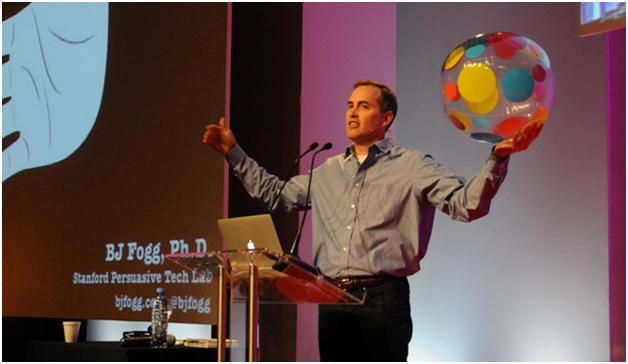
Creating SUSTAINABLE Behavioral Change Part 7
Hold on to your hats! If you haven’t been introduced yet to the work of BJ Fogg, this information is going to rock your world.
It always strikes me how - the first time you hear a new name, you completely forget it so the second time you hear it, it’s almost like De ja vu. The third time you hear it you start to take notice and I swear it’s only after at least three times that you finally start to pay attention. Well if this is the first time you’ve heard the name BJ Fogg, don’t make the mistake that I did of waiting till you hear it three more times. Pay attention now. This information is cutting edge and will rock your world. BJ Fogg is a professor at Stanford University and is rapidly becoming the new god of behavioral change: Just like orange is the new black, BJ Fogg is the new Prochaska.
What Fogg is saying that’s so different from all the other experts out there is that changing behavior is NOT about getting motivated it’s about making the initial behavior change so easy to accomplish that you literally can’t fail. I deliberately reviewed Prochaska’s stages of change in the previous installment so you could compare it with this new approach. As Prochaska likes to say in stage 2: “The more reasons you have for making a change, the more likely you are to stick with program.” And that’s about increasing motivation which is a key part of his and everyone else’s approach to behavioral change.
Motivational interviewing (MI) – another popular approach to behavioral change – just like its name implies – is all about helping a client increase motivation. A classic MI technique is to ask the following two questions:
“How motivated are you to make the change on a scale of 1-10?”
“How can we increase your motivation one or two notches on that scale?”
BJ Fogg’s approach is almost exactly the OPPOSITE. It’s about making the change easier to do FIRST and worrying about increasing motivation later. As he points out, when you ask a person to exercise 30 minutes a day or keep track of their calories, that’s HARD to do. And these same people are expected to “grind it out,” i.e., just dive in and start exercising 30 minutes a day or counting calories or whatever. Some days they succeed and other days they fail. If they fail often enough trying to do this new behavior, you, as the person who tried to MOTIVATE them to do this, may have actually done your client more HARM THAN GOOD: Because now they feel like a failure.
Think about that for a moment.
BJ Fogg is trying to get us to cultivate a very simple habit that’s so easy, you can’t fail. It might be to walk 2 minutes a day or eat two salads a week or floss one tooth. Yes it sounds TOO easy at first, but what Fogg’s research tells us is: As we establish these “tiny habits” our self-efficacy grows. And it’s our improved self-efficacy that makes the change possible to SUSTAIN. Instead of failing at the new behavior, we get confident, and we can build on that habit over time.
In my next installment I will show you the specific mechanics about how Foggs approach to change works.





James Porter
Author